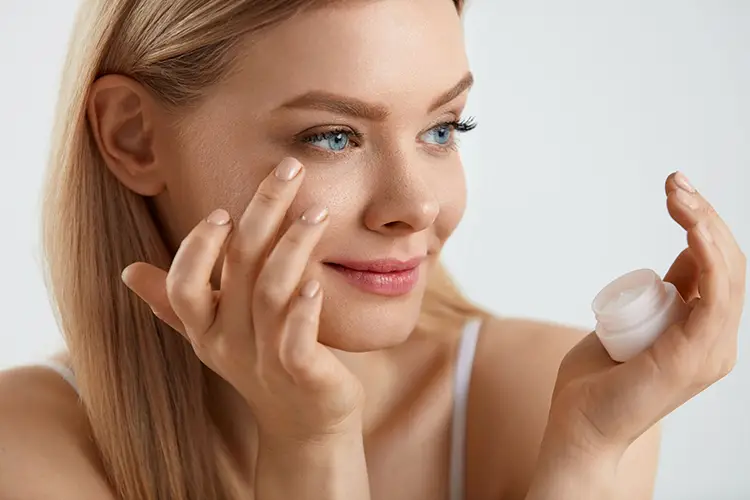When it comes to skincare, one product that often raises a lot of questions is eye cream. Whether you’re a beauty novice or a skincare fan, you’ve probably wondered when to start using it. Is it too early in your 20s? Is it too late in your 40s? The truth is, there’s no universal answer, but we can help you make an informed decision about when to introduce this little skincare hero into your routine. In this article, we’ll explore the ideal age for starting eye cream, the factors influencing the right time to begin, and how to choose the best eye cream for your unique needs.
Table of contents
Why Eye Cream is Important?
Before we discuss the right age to start using eye cream, it’s important to understand the skin’s unique characteristics around your eyes. The skin around the eyes is thinner and more delicate than the rest of your face. This area is prone to early signs of aging, like fine lines, puffiness, and dark circles, due to its fragility and the lack of oil glands. That’s where eye cream comes in—it’s formulated to hydrate and protect this sensitive skin, often with ingredients specifically targeting common concerns like crow’s feet, puffiness, and dark circles.
Types of Eye Creams
Eye creams come in a variety of formulations, each designed to address specific issues:
- Hydrating Eye Creams: Focus on deep hydration to help with dryness and fine lines.
- Anti-Aging Eye Creams: Target wrinkles and sagging with ingredients like retinol and peptides.
- Brightening Eye Creams: Combat dark circles and dullness with ingredients like vitamin C and caffeine.
Determining the Right Age to Start
Early 20s: Prevention is Key
If you’re in your early 20s, you might not have noticeable signs of aging yet, but this is an excellent time to start with a lightweight, hydrating eye cream to maintain the skin’s moisture barrier and prevent fine lines. A hydrating eye cream with ingredients like hyaluronic acid and peptides can help retain moisture and maintain youthful-looking skin.
Late 20s to Early 30s: The First Signs Appear
In your late 20s to early 30s, you might notice the first signs of fine lines and crow’s feet around your eyes. This is a great age to incorporate an anti-aging eye cream that includes antioxidants and peptides to support collagen production. Look for eye creams with hyaluronic acid for extra hydration.
Late 30s to Early 40s: Stepping Up the Game
At this stage, fine lines are usually visible, and wrinkles might be starting to form. An eye cream with retinol or other retinoids, combined with moisturizing ingredients, can help stimulate collagen production, increase cell turnover, and diminish the appearance of wrinkles.
50s and Beyond: Targeted Solutions
For those over 50, the skin is generally thinner and less elastic. Choose a deeply hydrating eye cream with peptides and antioxidants to help firm and nourish the delicate skin around the eyes. Retinoids and peptides can be beneficial but start with lower concentrations to avoid irritation.
Choosing the Right Eye Cream
Know Your Skin Type
Selecting an eye cream suited to your specific skin type is crucial. Dry skin benefits from thicker creams, while oily skin can fare better with lighter gels.
Identify Your Concerns
Is puffiness your main issue, or are you more concerned about dark circles and crow’s feet? Look for targeted formulas that can directly address your specific needs.
Check the Ingredients
Certain ingredients can effectively tackle different concerns. Here are some key ingredients to look out for:
- Retinol/Retinoids: Encourage collagen production and reduce fine lines.
- Peptides: Help boost collagen and improve firmness.
- Hyaluronic Acid: Deeply hydrates and plumps up the skin.
- Caffeine: Reduces puffiness and dark circles by improving circulation.
- Vitamin C: Brightens and fights free radical damage.
Test for Sensitivity
The eye area is sensitive, so testing new products on a small skin patch can prevent irritation. If you experience burning or excessive dryness, switch to a gentler formula.
Tips for Incorporating Eye Cream into Your Routine
- Cleanse First: Ensure your skin is free from dirt, oil, and makeup by cleansing thoroughly before applying eye cream.
- Use Your Ring Finger: Apply eye cream gently with your ring finger, which provides the lightest touch to avoid tugging or pulling on the delicate skin around your eyes.
- Apply in a Dabbing Motion: Lightly dab the eye cream around the orbital bone, which encircles your eyes. Avoid directly applying to the lids unless the product is explicitly safe.
- Start with a Small Amount: A pea-sized amount is typically sufficient for both eyes. Less is more with eye cream since the skin in this area is thin and absorbs products quickly.
- Be Consistent: Use your eye cream twice daily, in the morning and at night. Consistency is key to achieving and maintaining the best results.
- Layer Correctly: Apply your eye cream after cleansing and toning before your moisturizer to ensure optimal absorption of active ingredients.
- Store Properly: Keep your eye cream in a cool, dark place, and make sure the lid is tightly closed. If the product contains ingredients sensitive to heat or light (like vitamin C), consider storing it in the refrigerator.
- Stay Gentle. Avoid over-applying or rubbing harshly. The gentle application ensures that you don’t damage the sensitive eye area.
- Protect with SPF: If your eye cream doesn’t contain SPF, apply sunscreen afterward to protect the delicate skin around your eyes from UV rays.
- Patience is Key: Give your eye cream at least a month to show visible results and stick with it as part of your daily regimen for long-term benefits.
Frequently Asked Questions
Can eye creams cause irritation?
Yes, some eye creams can cause irritation, especially those with potent active ingredients like retinol. Doing a patch test before applying a new eye cream is essential to ensure it’s compatible with your skin.
How often should I apply eye cream?
Generally, eye cream can be applied twice daily, once in the morning and once at night. However, follow the instructions on your specific product, as some formulations are intended for use only once daily.
Should I use different eye creams for day and night?
Some people find it beneficial to use separate eye creams for day and night. Day creams often focus on hydration and brightening, while night creams may contain more potent ingredients like retinol.
Can I use my face moisturizer instead of eye cream?
While you can use your facial moisturizer on the eye area, it might not be as effective because eye creams are formulated specifically for the delicate skin around the eyes.
How soon will I see the results from an eye cream?
Results vary based on the product and your skin condition. Some people see immediate improvements in hydration and puffiness, while results for fine lines or wrinkles may take several weeks. Be consistent, and give your eye cream time to work.
In the end, there’s no exact “right age” to start using eye cream. Instead, consider your unique skincare needs, genetic factors, and lifestyle. Whether you’re aiming for prevention in your 20s or seeking more intensive care in your 40s and beyond, there is an eye cream that can meet your needs. Remember to choose products with quality ingredients that target your specific concerns and maintain a consistent skincare routine. By being proactive and nurturing the delicate skin around your eyes, you’ll set yourself up for long-term beauty and health.
Related posts:
What’s in Your Skincare Products? Avoid These 4 Dangerous Ingredients!
20 Proven Ways to Get Ride of Stretch Marks: Expert Insights and Tips
Essential Vitamins and Supplements for Healthy Skin and Hair

